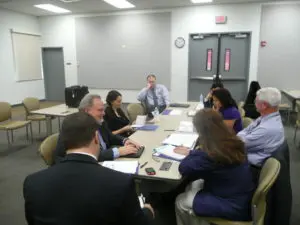Welcome to our Business Continuity Planning expertise at All Hands Consulting, where our approach is not just about creating plans but fostering a collaborative and comprehensive strategy. When engaging in Business Continuity Planning (BCP) and BCM Plan Development, we adhere to a meticulous five-phase project plan that ensures a resilient and adaptive preparedness strategy. Here's a closer look at our approach:
- Business Impact Assessment (BIA): We commence with a thorough Business Impact Assessment, working closely with your organization's staff to understand the intricacies of your operations. This phase lays the foundation for identifying critical business functions, assessing vulnerabilities, and determining the potential impact of disruptions.
- Business Continuity Plan (BCP) Development: Building on the insights gathered from the BIA, we collaboratively develop a robust Business Continuity Plan (BCP). This plan is not just a document; it's a tailored strategy outlining clear procedures and protocols to ensure the continuity of essential business functions during and after disruptive events.
- Staff Training: Recognizing the pivotal role of personnel in effective continuity, we prioritize staff training. Our approach involves equipping your team with the knowledge and skills necessary to execute the BCP seamlessly. This ensures a coordinated response and enhances overall organizational resilience.
- Business Continuity Plan Validation: Drills and Exercises: Practical validation is key to the effectiveness of any plan. We facilitate drills and exercises that simulate real-world scenarios, allowing your team to test the BCP in a controlled environment. This phase serves as a valuable learning experience and helps identify areas for refinement.
- Program Effectiveness Evaluation & Monitoring: Our commitment doesn't end with the development and validation of the plan. We implement an ongoing evaluation and monitoring process to assess the effectiveness of the entire Business Continuity Program. This iterative approach ensures that your organization remains adaptable to evolving risks and challenges.
Why Choose All Hands Consulting:
- Collaborative Partnership: We believe in collaboration. Our approach involves working closely with your organization's staff, leveraging their insights, and tailoring solutions that align with your unique needs.
- Proven Methodology: The five-phase project plan is a proven methodology that we have successfully implemented across diverse industries. It ensures a systematic and thorough approach to Business Continuity Planning.
- Continuous Improvement: Preparedness is an ongoing process. Our commitment to continuous improvement means that we actively seek feedback, monitor program effectiveness, and adapt strategies to enhance overall resilience.

The BIA is typically conducted as part of our comprehensive business continuity service. A joint client and All Hands team will identify, review, evaluate and prioritize issues that pose potential crises and/or negative impact for the client’s business operations.
The joint team will also analyze the client’s current overall business continuity management planning efforts. The BIA is a diagnostic survey that consists of issue analyses, risk identification, and assessment of potential business impacts and crisis situations. The diagnostic survey assists us to determine the client current capabilities, level of training, and categorization of potential business disruption situations.
All Hands Consulting are experts at identifying interdependencies and program gaps. We can facilitate supply chain risk assessments and capabilities reviews to ensure that your organizational supply chain continues to operate an intended.
Crisis Management Planning
A crisis, defined as any critical incident or event with the potential to significantly disrupt an organization's operations, profitability, or reputation, underscores the importance of adept crisis management. Crisis Management encompasses the orchestration of an organization's response to such events, executed in a timely and effective manner. The primary objective is to proactively prevent or, if unavoidable, minimize the adverse impact on the organization's operations, profitability, and reputation.
In this realm, All Hands Consulting stands out as a provider of diverse services aimed at fostering the creation and enhancement of robust crisis management programs. These services extend beyond mere response mechanisms, delving into the strategic development of comprehensive crisis management frameworks. By engaging with All Hands Consulting, organizations gain access to tailored solutions that not only address immediate crises but also contribute to long-term resilience, ensuring the safeguarding of operational continuity, financial viability, and reputational integrity. In essence, the offerings provided by All Hands Consulting are instrumental in fortifying organizations against the multifaceted challenges posed by unforeseen critical incidents and events.
Crisis Communication Training
The success of emergency response hinges critically on the adeptness and professionalism with which emergency managers convey essential information to the public, employing direct channels and media intermediaries. In the face of a significant disaster, the spotlight of national and even international media can suddenly illuminate agencies that may not have previously allocated resources for advanced communication strategies or enlisted the expertise of public relations professionals. The ability to instill public confidence in the government or private sector's crisis response lies entirely in how emergency managers are perceived through the lens of communication and media portrayal.
In the tumult of a major disaster, emergency managers become de facto communicators, navigating the complexities of disseminating crucial information to a diverse and often anxious public. The sudden influx of media attention, reaching far beyond local boundaries, underscores the need for these managers to swiftly adapt their communication strategies. In such scenarios, agencies find themselves thrust into the spotlight, necessitating a rapid transition from managing the crisis at hand to concurrently managing public perception.
The dynamic nature of media coverage during crises underscores the importance of preparedness in communication strategies. Effective communication not only ensures the accurate dissemination of information but also plays a pivotal role in shaping the narrative surrounding emergency response efforts. It is, therefore, imperative for emergency managers to not only master crisis response tactics but also cultivate the skills required to navigate the intricate landscape of media engagement, fostering a positive public perception that is vital for building and maintaining public trust during times of crisis.
Product Recall
The process of withdrawing a product from the market is not merely a financial setback; it represents a substantial investment in terms of both profitability and brand value. It prompts critical questions for businesses: Does your business continuity plan meticulously factor in the intricate risks associated with a product recall? Is your enterprise adequately equipped to navigate the complexities of a high-profile product recall situation? And perhaps most crucially, is your organization prepared to safeguard its hard-earned reputation?
Beyond the sensationalized headlines, there exist profound considerations for businesses confronted with the daunting task of recalling a product. In an era where billions of dollars are dedicated to meticulously crafting and nurturing brand image, the luxury of hoping that the risks of a product recall have been sufficiently managed is simply unaffordable.
A product recall extends far beyond the financial implications, delving into the delicate realms of customer trust and brand perception. The repercussions of a mishandled recall can be enduring and far-reaching, eroding the meticulously built brand equity over years. As such, businesses must go beyond the superficial acknowledgment of potential risks and proactively integrate robust strategies into their business continuity plans.
The true litmus test for a business's resilience lies not just in its ability to recall a product efficiently but also in its capacity to mitigate the broader impact on profitability and brand reputation. A comprehensive approach to risk management, crisis communication, and reputation protection is indispensable for organizations aiming not just to weather the storm of a product recall but to emerge with their brand integrity intact.
Contingency planning should be an integral part of your overall business continuity management process. Business Continuity and emergency planning requires a thorough review of your organization’s entire operation for safety and operational vulnerabilities. Following a business impact assessment (BIA) methodology, you should review essential operations as well as key suppliers, business, and data partners as well as infrastructure components that are deemed vital. Planning must include detailed contingency plans that will guide your organization in performing its critical functions during a disruption or disaster.
All Hands Continuity of Operations and Continuity of Government services are based on the belief that COOP and COG plans should be developed as part of a Comprehensive Emergency Management Program using a planning process based on federal guidance, industry standards (such as those from the Business Continuity Institute), and best practices in emergency management and continuity planning.
COOP and COG plans should detail all of the procedures that define how a government and the community will continue or recover its minimum essential functions in the event of a disaster.
Plan Maintenance services help you maintain and update your plan as a living document. All Hands members are experienced in maintaining plans with or without software. We have consultants experienced in using various planning software tools.
